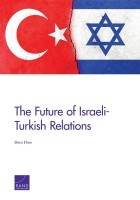RAND by Shira Efron: The Future of Israeli-Turkish Relations
Research Questions
How have Israeli-Turkish relations evolved?
What is the status of Israeli-Turkish economic ties since their 2016 normalization?
What are the standing political and security issues between Israel and Turkey?
How might the future of Israeli-Turkish relations develop?
What implications do Israeli-Turkish ties have for U.S. interests in the Middle East?
This report, which draws largely on Israeli and third-party views, examines the relations between Israel and Turkey, concentrating on the state of economic, diplomatic, and security ties after the 2016 reconciliation between the two countries and the possible futures of these ties.
Israel and Turkey have almost seven decades of relations, but even after the reconciliation, ties remain strained. While the Israeli and Turkish business communities would like to resume former levels of engagement, and there is interest in cooperation over natural gas, relations in the diplomatic and security spheres are tense because of distrust of Turkish President Recep Tayyip Erdoğan and differences between the countries over the future of Syria and the Israeli-Palestinian conflict. Any change, for better or worse, in Israeli-Palestinian relations, will have implications for the ties between Israel and Turkey, as demonstrated by the May 2018 diplomatic rift over the violent clashes in Gaza and the opening of the U.S. embassy in Jerusalem.
Key Findings
Strong Bedrock, Formidable Challenges
Israel and Turkey still have strong common interests, especially economically. Natural gas development is still a prospect, and both countries share the objective of stability of Gaza.
However, Israeli opinion of Turkish President Recep Tayyip Erdoğan and differences between the countries over the future of Syria and the Israeli-Palestinian issue will probably keep relations cold.
Israel now has economic and security cooperation alternatives to Turkey, such as Cyprus and Greece. Israeli defense industries have found larger markets than Turkey for their exports including India, South Korea and Japan.
Changes in the status of the Israeli-Turkish relationship will probably occur alongside developments on the Israeli-Palestinian front, as demonstrated by the May 2018 diplomatic rift over the violent clashes in Gaza and the opening of the U.S. embassy in Jerusalem.
Table of Contents
Chapter One
Introduction
Chapter Two
A History of Ups and Downs in Bilateral Relations
Chapter Three
Normalization Achieved After a Six-Year Process
Chapter Four
Post-Rapprochement Economic Relations
Chapter Five
Diplomatic and Security Relations After Normalization
Chapter Six
Conclusion: Israeli-Turkish Ties Face Formidable Challenges

